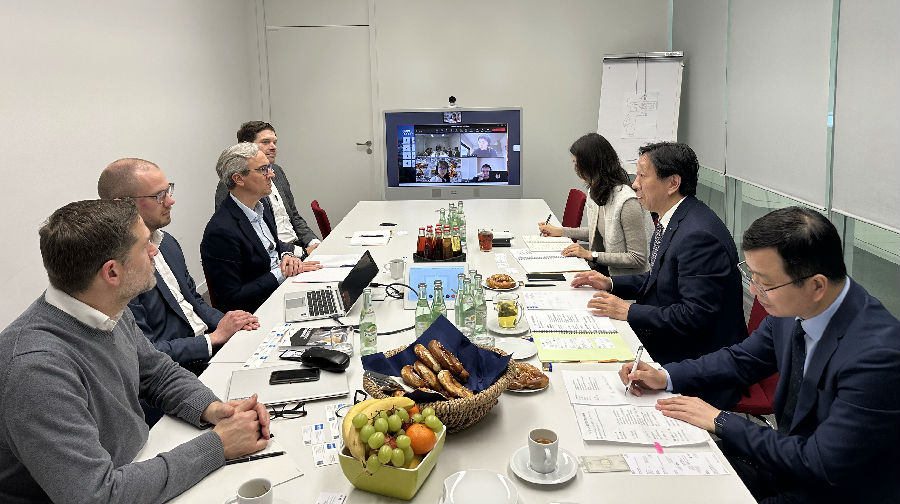HBIS Chairman Met BMW Vice President Patrick Hudde
2023-04-26

April 19, HBIS Chairman Yu Yong met BMW Vice President of Sustainability Supply Chain,Raw Material Management Patrick Hudde in BMW Munich headquarter and both parties discussed to strengthen the supply chain cooperation, strategic coordination and carbon reduction efforts. HBIS Vice President Li Yiren and BMW Head of Purchasing Steel & Aluminium Sheet & Cast Aluminium & Raw Material Recovery Michael Frosch also attended the meeting.
Yu Yong said carbon reduction had been a consensus and action of the globe. Over the years, HBIS has been pursuing a green & low carbon development path and, the world’s first 1.2 million-ton hydrogen steel showpiece project, adopting short procedure arc furnace technology has been in cooperation. BMW was the first automaker that promoted green and low carbon steel supply chain in Chinese market. Sharing the same low carbon and green development concept, HBIS and BMW has been working even closer. In August 2022, the parties signed the MOU of Green & Low Carbon Steel Supply China Cooperation to promote the efforts on Low carbon footprint development and their resolve the lead the green and low carbon development. In future, besides quality and prices, manufacturers will consider more over the low carbon steel in choose of their steel materials. This trend will encourage the low carbon development of steel industry, automobile industry and even more industry. Social responsibilities and market demands are both driving the development of low carbon footprints. HBIS and BMW are jointly developing a green and low carbon steel supply chain to make it a market oriented mechanism to reduce their carbon emission and make significant benefits.
Yu Yong said HBIS and BMW had highly strategic collaboration in the carbon footprint and green low carbon development. HBIS was always working with strong players and flowing era and trends. BMW is a highly important and concerned client for HBIS and in future, HBIS and BMW are able to make innovative relationship beyond traditional business cooperation. Both party will continue to deepen the cooperation in various fronts and contribute both green and low carbon supply chain to the grand efforts of global carbon reductions and add more value to their strategic cooperation.
Patrick Hudde said, as the world becomes more concerned about climate change, there is a consensus to reduce the carbon footprint. In particular, BMW was the first in the Chinese market to sign a memorandum of cooperation with HBIS to build a green mild steel iron supply chain, which conveyed the new demand for steel materials to the market and promoted European steel enterprises to accelerate the reduction of carbon footprint.BMW attaches great importance to the production process and process of green mild steel iron, deeply understands the technical roadmap and realization path of partners, and ensures that the steel materials purchased in the future come from green energy. BMW can only achieve its goal of reducing its carbon footprint if it has partners that produce green and low-carbon production processes and provide green steel materials.Recent years, Chinese steel industry has made great changes in carbon footprints and huge progress and HBIS is such a great example. HBIS hydrogen vertical furnace direct reduction technology and arc furnace shot process steel making technologies own great advantages. TO BMW, HBIS is a valuable partner.
Patrick Hudde said China is an important market for BMW, especially the growth prospects of the new energy vehicle market, so the cooperation between BMW and HBIS not only has potential, but also can change the industry's perception of the market. More importantly, it plays an important role in reducing the carbon footprint. It is a right choice for BMW to take HBIS as its partner. Looking forward to the future, BMW and HBIS should further enhance understanding, strengthen cooperation and exchanges, deepen strategic partnership, and jointly make greater contribution to promoting green and low-carbon development on the basis of good cooperation in the early stage.
